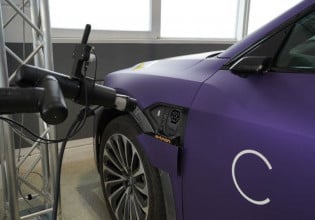Britishvolt to Build UK’s First Battery Gigafactory
EV battery startup Britishvolt will build a £2.6 billion lithium-ion battery gigafactory in northeast England, eyeing production by the end of 2023.
Britishvolt, a startup specializing in lithium-ion batteries for electric vehicles, is investing £2.6 billion ($3.5 billion USD) to build a battery gigafactory in northeast England’s Blyth, Northumberland.
Spanning 95 hectares (about 235 acres), the site will be capable of producing more than 300,000 lithium-ion batteries for the U.K.’s automotive sector. The project is the most significant industrial investment in the region since 1984, when Nissan built a massive car manufacturing plant in Sunderland, England.
A rendering of Britishvolt’s battery gigaplant in Blyth, Northumberland. (Image courtesy of Britishvolt)
Construction is slated to kick off this summer, with Britishvolt eyeing production in late-2023. By 2027, the startup aims to hire 3,000 employees at the site, providing 5,000 jobs in the broader supply chain.
The announcement came shortly after Britishvolt unveiled plans to build a global headquarters in the West Midlands, with operations planned for 2022.
Britishvolt also recently announced a partnership with German manufacturing giant Siemens to use its digital enterprise technology design and simulation tools to speed the company’s lithium-ion battery production before gigafactory construction is completed.
Since Britishvolt plans to use renewable energy sources to power the plant, the site selection drew on Blyth’s access to hydro-electric power generated in Norway and transmitted 447 miles under the North Sea through the North Sea Link inter-connector.
Britishvolt’s upcoming gigafactory is part of British Prime Minister Boris Johnson’s comprehensive green energy plan, aiming for a net-zero economy by 2050. Last November, the U.K. announced plans to ban the sale of new petrol- and diesel-based cars and vans from 2030. Hybrid vehicle sales are permitted until 2035.
While it’s not entirely clear how Britishvolt will fund the gigafactory development, Reuters reported that the startup applied for government backing through a new £1 billion fund focused on boosting EV battery mass-production in the U.K.
The gigafactory news comes as the U.K.’s existing automotive sector faces post-Brexit challenges. As reported by Bloomberg, the government’s new battery requirements pose significant trade repercussions for the country’s existing vehicle plants. To trade tariff-free, 30% of battery pack content must be sourced from the U.K. or European Union, and by 2024, these requirements will become even more stringent. The pressure is on for the U.K. to step up its EV battery production capacity to remain competitive in the global market.






